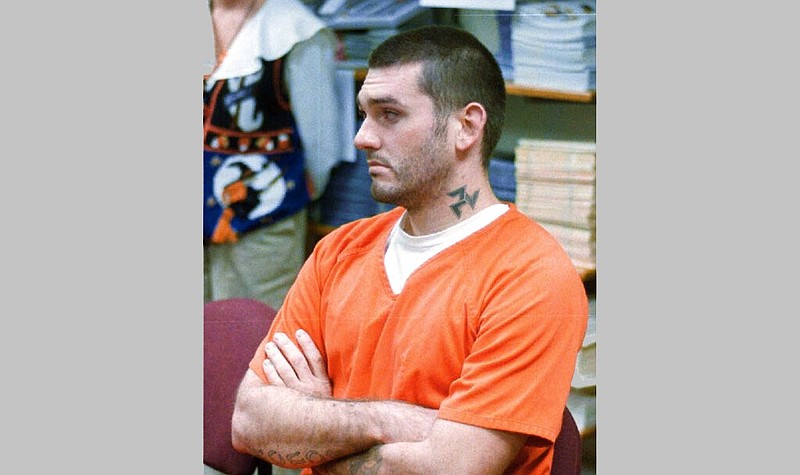TERRE HAUTE, Ind. -- The execution of Daniel Lee did not go forward as scheduled Monday because of an injunction put in place hours before the convicted killer was to be put to death.
For the second time in eight months, a federal judge in Washington, D.C., ordered a delay in Lee's execution, stating that there are legal issues to resolve related to the federal government's newly chosen lethal injection protocol.
The U.S. Department of Justice immediately appealed the decision to the U.S. Court of Appeals for the D.C. Circuit, which in a ruling late Monday night wouldn't allow the execution to go forward. The Trump administration has asked the Supreme Court to weigh in, The Associated Press reported.
Uncertainty reigned at the United States Penitentiary in Terre Haute throughout the day and evening on Monday as prison officials remained ready to carry out Lee's execution if the injunction was lifted by a higher court.
Lee, 47, was convicted of murdering a family in their Tilly-area home 24 years ago. William Mueller, 52; his wife Nancy, 28; and her 8-year-old daughter, Sarah Powell, were suffocated with plastic bags and duct tape before their bodies were dumped in the Illinois Bayou outside Russellville.
Lee and his co-defendant, Chevie Kehoe, 47, were convicted in 1999 of three counts of murder, as well as additional federal charges of racketeering and conspiracy. Both men were white supremacists at the time of the slayings, according to trial testimony. Lee's attorneys have said he has renounced those beliefs.
Kehoe was sentenced to life in prison while Lee got the death penalty.
Eight media witnesses to the pending execution, including one from the Arkansas Democrat-Gazette, waited for hours Monday inside a training facility near the prison for news to come down about the appeal. Hours went by without any word.
U.S. District Judge Tanya Chutkan stated Monday morning, as she did prior to Lee's originally scheduled execution last December, that the Justice Department was "short-circuiting" the judicial process by rushing to introduce a new execution method.
The government announced last year its plans to use pentobarbital, a barbiturate that attacks the brain and nervous system. States such as Texas and Missouri use pentobarbital for executions, and veterinarians regularly use it to euthanize animals.
Chutkan, however, stated in her ruling that there is evidence the drug "poses an unconstitutionally significant risk of serious pain."
Previously, the U.S. government used a three-drug protocol for executions. No federal death row inmate has been executed since 2003.
Arkansas executed four inmates in 2017 using the three-drug protocol.
In November, Chutkan criticized the Justice Department's decision to introduce the single-drug protocol without congressional approval. The U.S. Court of Appeals for the D.C. Circuit overturned her decision, and Attorney General William Barr subsequently scheduled Lee's execution, as well as the executions of three other federal death row inmates.
Chutkan's Monday ruling noted that the inmates had brought forth evidence that death-row inmates executed using pentobarbital had experienced trouble breathing, similar to that of drowning or strangulation, according to The Associated Press.
She also noted that the inmates had offered alternative execution methods such as the use of other drugs or a firing squad.
Chutkan's latest ruling drew the ire of U.S. Sen. Tom Cotton, R-Ark.
"This Obama[-appointed] judge has already rushed to aid this white supremacist murderer of three Arkansans and been overturned on appeal," Cotton tweeted. "Yet here she goes again, just hours before the execution. The activism needs to stop, justice needs to be done."
Monday's delay took place hours before Lee's scheduled execution at 4 p.m.
As of 9 p.m., prison officials were still waiting on the U.S. Court of Appeals in Washington, D.C., to rule on Chutkan's stay.
A series of judicial decisions recently has led to uncertainty about Lee's execution.
On Friday, a federal judge in Indiana halted the execution after Nancy Mueller's family members filed a motion arguing that the U.S. government was putting their health and safety at risk by holding the execution during the covid-19 pandemic.
The 7th U.S. Circuit Court of Appeals on Sunday overturned that injunction. Afterward, the plaintiffs in that case vowed to take the matter to the Supreme Court. The nation's high court had not announced Monday whether it would hear the case.
Several of Nancy Mueller's family members -- including her mother, brother, sister and niece -- have said publicly for years that they never wanted to see Lee get the death penalty. They have referred to the evidence introduced at trial that showed Kehoe was the most culpable because he planned the murders and was the one who killed the small girl after Lee refused.
Prison officials on Monday designated two areas on the Federal Correctional Complex property for activists -- one area for those opposed to the death penalty and another for those in favor. No activists showed up at either area Monday, but someone from Death Penalty Action, an anti-death penalty group, drove around Terre Haute earlier in the day with a sign on the side of his trailer that read, "Stop executions now," according to the AP.
Lee had access to visitors on Monday, and he visited with his spiritual adviser -- an Appalachian Pagan minister -- prison officials said. Three of Lee's family members, his attorneys and spiritual advisers were expected to witness his execution, the AP reported.
No announcement was made Monday about whether Lee's execution would be rescheduled.
Prior to Chutkan's ruling, the federal government also was scheduled to execute Wesley Purkey on Wednesday and Dustin Lee Honken on Friday. Purkey and Honken, like Lee, were convicted in murders involving children.
